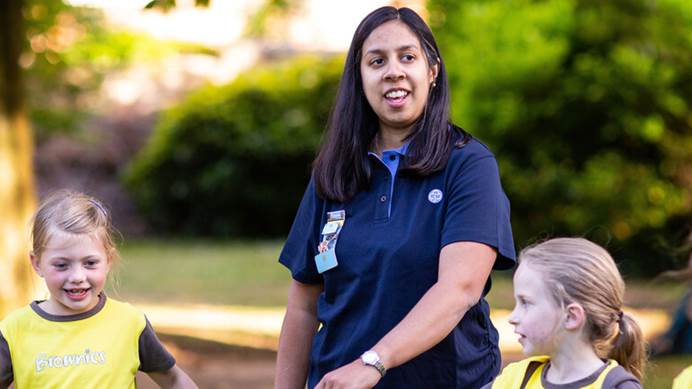Refugee and asylum seeking members
Welcoming refugees and people seeking asylum to guiding
Girlguiding can have great value to people who are refugees or seeking asylum.
It can be a support network, a place to make friends and a chance take part in activities and adventures. Even if they might not stay in the UK long-term, we should welcome them into guiding.
Who is a refugee?
A refugee is a person who has fled war or persecution, and is outside the country of their nationality and who the UK Government has recognised would be at risk if they returned to their home country. Refugees can stay in the UK long-term or indefinitely and they can bring their immediate family members to join them.
Usually, refugees in the UK are given 5 years' leave to remain as a refugee. They must then must apply for further leave.
Who is a person seeking asylum?
A person seeking asylum is someone who has fled their home country, is seeking sanctuary in another country and has formally applied for asylum in another country but whose application is still in progress. They have a legal right to stay in the country while waiting for a decision on their application. If an asylum seeker’s application is granted, they become a refugee.
If the application is declined, and they have no other claim for protection awaiting decision, they become a refused asylum seeker. There's often stigma towards refused asylum seekers, making the guiding community's support even more important. There's often the right to appeal and refusals can be overturned. If they're still refused asylum, they may choose to return to their home country themselves or the government may remove them. For some, it's not safe or practical to return until conditions in their home country change.
Welcoming refugees and people seeking asylum
We're a space for all girls and women. Every unit should welcome and accept asylum-seeking and refugee children and adult volunteers. Take the time, care and attention to understand their needs.
You should be aware that:
- Those seeking asylum can have limited or no choice in where they live.
- Families will receive limited funds for living costs and may struggle with costs for activities and uniform.
- They may have limited access to health care.
- Many will have uncertainty as to their long-term status and whether they'll have the right to live in the UK.
- They're at a high risk of discrimination and other forms of prejudice. Be mindful of the stresses they'll be under.
- Avoid making assumptions, for example about what language they may speak or what their experiences have been. Make time to listen.
Refugees and people seeking asylum will have experienced a lot of disruption and can be quite vulnerable. They might've fled wars, seen or experienced abuse, been separated from loved ones and have difficult memories of leaving their home country.
Many refugees and people seeking asylum have experienced trauma. Keep this in mind when planning activities and having conversations because some topics may be difficult or upsetting for some people. As with any vulnerable young member or volunteer, these complex needs should be taken into account when planning and risk assessing your activities.
For example, everyday discussion topics, such as extended family, early childhood or religious practices, may be upsetting and bring up difficult issues. Don’t probe for the reasons why they left their home country or ask about their route to the UK, and don't try to give immigration advice. They might choose to share their story with you and with friends, but always be led by them and what they want to share. Don't share anything they do tell you with other parents or volunteers without their permission.
Children cope in different ways. Some might start to share their experiences with adults they trust, including leaders, or talk to girls in their unit. If you have a concern about a child always seek support from your commissioner or our safeguarding team at [email protected].
There are UMAs for every section that can help you welcome young refugees into your unit. These include:
Rainbows
A warm welcome in UMA pack 6
Rainbows will explore different ways to welcome a new rainbow to their unit. Together, the rainbows will create a Welcome Walkway, they will use this to walk along the footprints and share ways they can make their new Rainbow feel welcome!
Brownies
Mission understanding in UMA pack 6
Brownies will discover how to welcome others and find out new things about their unit. This activity is a great way to explore communication when making new friends. Brownies will discover good ways to communicate with newcomers, how to be welcoming and how to make new friends.
Celebrate good times together in UMA pack 5
As a unit, Brownies will work as a team to plan a fun Brownie celebration. This could be a wonderful welcome party for new Brownies joining their unit. They'll choose a theme, food and drink, entertainment, and decorations. Brownies will explore ways to celebrate new members of their unit and introduce them to what makes Girlguiding great!
Guides
Hello my fabulous friend in UMA pack 3
Guides will introduce themselves to the new members of their unit with this ice breaker. This activity is a fun way to learn each other’s names and get to know new friends by making them laugh.
Rangers
Memories last a lifetime in UMA pack 10
Rangers will discover how memories are made with friends. Together they'll discuss what makes a great friendship and share memories they have from their Girlguiding experiences. The unit can welcome new Rangers and share why they love Girlguiding. They'll make new memories and explore new friendships in their unit.
Many asylum-seekers may have limited or no English. You should adapt your activities to include them as they pick up a new language:
- Use drama, puppets, mime, pictures or music-based activities.
- Where you need to give print outs, try using a tool like Google Translate to help you communicate key points.
- Make labels or signs in English and their first language to show common guiding terms or areas of your meeting space or to give simple instructions. (Make sure you check which language will be best.)
- If appropriate and they're willing, you could encourage other members of the unit to learn some of their first language. Learning greetings like hello and goodbye is a good place to start.
- Adult volunteers can look online to find activity instructions in their first language. These can then be adapted for them to run with the whole unit.
The accessible guiding grant is available to all our young members and volunteers and this may be suitable for support with translating documents or having a translator attend meetings.
Asylum seeking adults may find it difficult to learn English as they don’t have the same access to education in the UK. Many children seeking asylum can start to become interpreters for their families and friends. Some can be proud of this role, but it can also expose them to difficult issues.
Be careful when asking children to translate conversations with their families or peers. If you’re worried that translating is affecting their wellbeing, share your concerns with your commissioner or our safeguarding team at [email protected].
Refugee and asylum-seeking parents and carers might be unfamiliar with life in the UK, misunderstand what Girlguiding is or not have experience of women-led organisations or organisations specifically for girls and young women.
You can tell them that we're a volunteer-led organisation that isn’t attached to the government or any faith groups. They may have specific queries about data protection and confidentiality. Check out our involving parents webpage for advice on how to involve parents and carers in your meetings.
The UK government allows refugee and adults seeking asylum to volunteer, so adult refugees and asylum seekers are welcome as Girlguiding members. Remember that anyone helping out more than twice a term will need to become a registered volunteer.
It can be difficult for those seeking asylum to produce the identification or records needed for some disclosure and recruitment checks. Each situation should be handled on a case-by-case basis and if you have any questions you can contact [email protected].
Depending on their legal status, refuges and asylum-seekers can have difficulty when travelling internationally. Refugees who can’t use or get a passport from their home country are generally issued with a refugee travel document to travel outside the UK.
Many will be able to travel visa-free to many countries all over the world. However, each country can have its own restrictions and could require a visa. You should seek specialist advice when making initial plans.
We’ve received a grant from The World Association of Girl Guides and Girl Scouts (WAGGGS) in response to the emergency crisis caused by war in Ukraine. Any unit that has girls or volunteers that want to join Girlguiding who have come from Ukraine and are directly affected by the war can apply for the grant. Find out more about the WAGGGS Ukraine emergency fund and how to apply.
Talk to your unit about global migration
Refugee Week is held every year in the third week of June, to coincide with World Refugee Day on 20 June. You can use this as an opportunity to explore conversations around migration and refuge in your unit. Find out more about refugee week and get educational resources.
The World Association of Girl Guides and Girl Scouts (WAGGGS) has issued a policy paper which outlines what they believe local, national and international decision makers can do to better support asylum-seekers and refugees. Read the WAGGGS policy paper.
Support organisations
UNHCR - The UN Refugee Agency - provides information about international law and the status of refugees and asylum seekers.
The British Red Cross - home to a range of information for young asylum seekers, including a database of specialist support groups.
The Refugee Council - information and specific advice and support for unaccompanied children seeking asylum.
The Children’s Society - for those supporting young asylum seekers and refugees.
Home Office - the government provides details of travel documentations for people living in Britain, who can't use or get a passport from their country.
National Youth Agency - has a webpage for volunteers and youth workers who are welcoming volunteers, including many additional resources.
WAGGGS - Encouraging all people to reject hate and welcome refugees.



